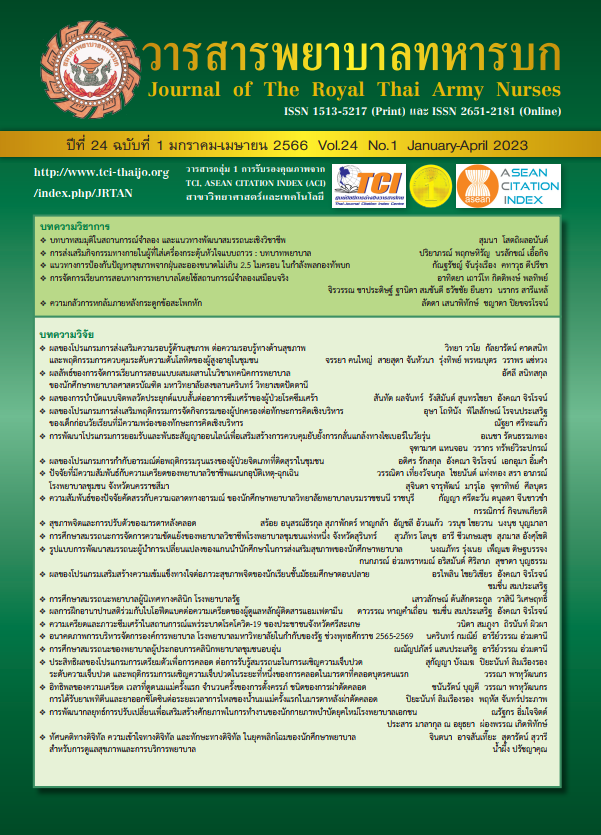Role-play Simulations and Guideline to Develop the Professional Competences
Keywords:
Role-play simulations, Professional competences, Performance assessmentAbstract
Using role-play simulations provide students an opportunity to learn through playing a role in real-life situation. Students can solve problems and make decisions, also discuss the results of their actions. The focus in a role-play simulation is on learning by doing. This simulation techniques help students perform clinical skills correctly and fulfill professional responsibilities in the future. This article focus on the benefits and guideline to develop the professional competences, by using Miller’s pyramid model. That divides the development of clinical competence into four, hierarchical processes. There is knowledge, application of knowledge, clinical skills competency and clinical performance. That can using role-play simulations for performance assessment to evaluate. The method has three steps: 1) Prepare to teach, by promotion of reflective, performance and interactive engagement. 2) Role-play simulation, where student ran the cases. 3) Debriefing, students opportunity to reflected their performance and assessment. That is the benefits to develop the professional competences.
Downloads
References
Chilcott J D. Effective Use of Simulations in the Classroom. Lees Stuntz. Creative Learning Exchange. 1996;1-35.
Stančić H & et al. Simulation Models in Education, Researchgate, 2007;11:469-81.
Tammone W. The Role of Simulation in Nursing Education. American Sentinel University, 2021; American Sentinel University Whitepaper,1-7.
Mehdipour-Rabori R, Bagherian B & Nematollahi M. Simulation-based mastery improves nursing skills in BSc nursing students: a quasi-experimental study. BMC Nursing, 2021; 20:10.
Rumore D, Schenk T & Susskind L. Role-play Simulations for Climate Change Adaptation Education and Engagement. Nature Climate Change, 2016; 6(8):745-50.
Wang Y & Ji Y. How do they learn: types and characteristics of medical and healthcare student engagement in a simulation-based learning environment. BMC Medical Education. 2021; 21(420):1-13.
Gamanik N M, Sanjaya Y & Rusyati L. Role-Play Simulation for Assessing Students’ Creative Skill and Concept Mastery. Journal of Science Learning, 2019; 2(3):71-8.
Yamauchi K & et al. Using peer role-playing to improve students’ clinical skills for musculoskeletal physical examinations BMC Medical Education, 2021; 21:322.
Bø B & et al. Nursing students’ experiences with simulation-based education as a pedagogic method in low-resource settings: A mixed-method study. Journal of Clinical Nursing, 2021;31(2):1-15.
Witheridge A, Ferns NG & Scott-Smith W. Revisiting Miller’s pyramid in medical education: the gap between traditional assessment and diagnostic reasoning International Journal of Medical Education, 2019;10:191-92.
Sim JH & et al. Students’ performance in the different clinical skills assessed in OSCE: what does it reveal? Medical Education Online, 2015; 20(1):1-7.
Kanglee K, Lawthong, N & Orathai P. Clinical Competency Assessment Model for Nursing Students Based on Miller’s Pyramid Framework Using Entrustable Professional Activities. Journal of The Royal Thai Army Nurses, 2021;22(1): 468-82. (in Thai)
Hecker KG, Norris J & Coe, JB. Workplace-Based Assessment in a Primary-Care Setting. Journal of Veterinary Medical Education, 2012;39(3): 229-40.
Smrekar M & et al. Use of the Objective Structured Clinical Examination in Undergraduate Nursing Education. Croatian Nursing Journal, 2017;1(1): 91-102.
Chernikova et al. Simulation-Based Learning in Higher Education: A Meta-Analysis Review of Educational Research, 2020;90(4):499-541.
Cant RP & Cooper SJ. Simulation-based learning in nurse education: systematic review. Journal of Advanced Nursing, 2010;66(1):3-15.
Dreifuerst K. The essentials of debriefing in simulation learning: A concept analysis. Nursing Education Perspectives, 2009;30(2): 109-14.
Downloads
Published
How to Cite
Issue
Section
License
Copyright (c) 2023 Journal of The Royal Thai Army Nurses

This work is licensed under a Creative Commons Attribution-NonCommercial-NoDerivatives 4.0 International License.
บทความหรือข้อคิดเห็นใดใดที่ปรากฏในวารสารพยาบาลทหารบกเป็นวรรณกรรมของผู้เขียน ซึ่งบรรณาธิการหรือสมาคมพยาบาลทหารบก ไม่จำเป็นต้องเห็นด้วย
บทความที่ได้รับการตีพิมพ์เป็นลิขสิทธิ์ของวารสารพยาบาลทหารบก
The ideas and opinions expressed in the Journal of The Royal Thai Army Nurses are those of the authors and not necessarily those
of the editor or Royal Thai Army Nurses Association.






